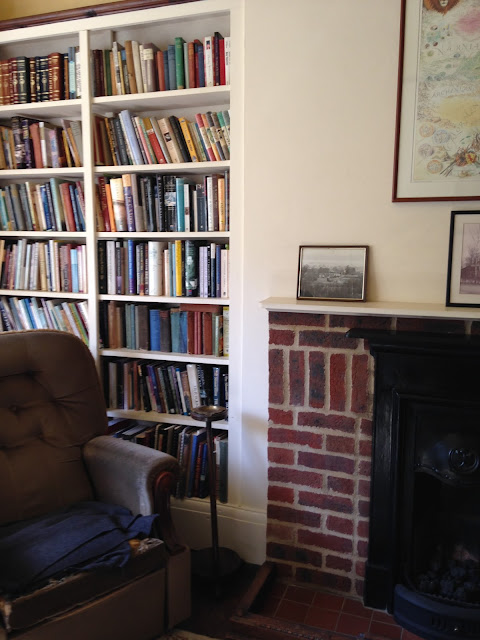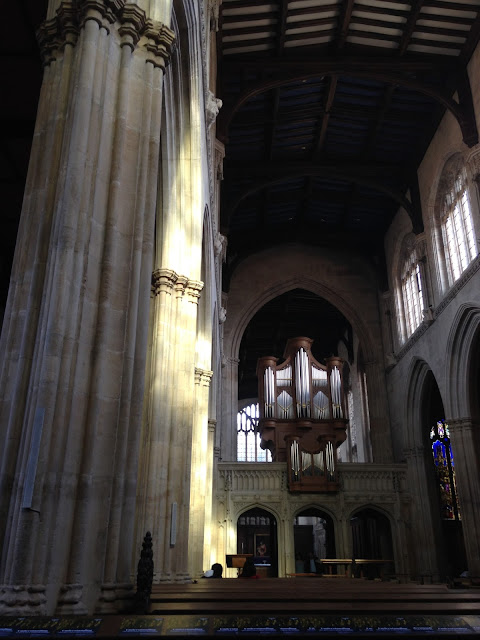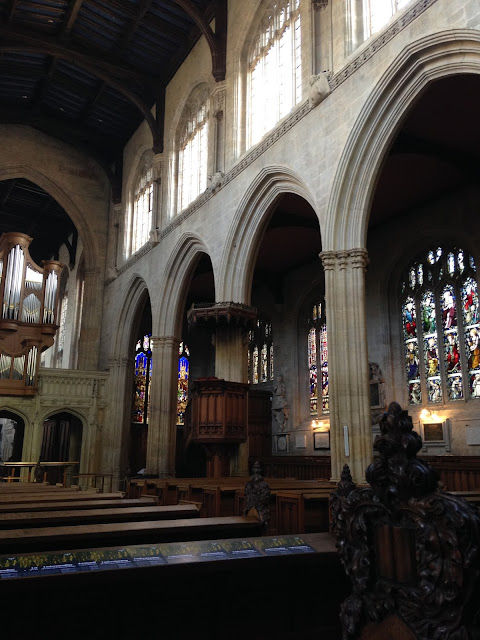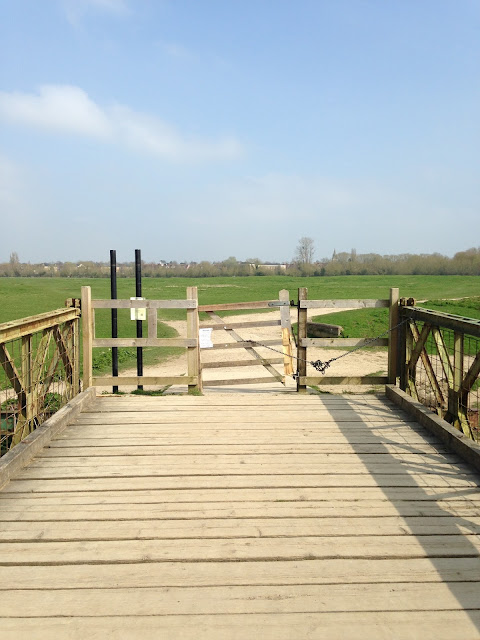We live in a broken, muddy world, but it is beautiful & created for good. God can use it all for His glory.
26 April 2017
Towers and Branches
Not of all my eyes see, wandering on the world,
Is anything a milk to the mind so, so sighs deep
Poetry to it, as a tree whose boughs break in the sky.
- Gerard Manley Hopkins
The whole of Oxford is a mixture of ancient stone towers with bells that ring hourly and/or quarter hourly. In between these towers scattered all over the city are trees that are rooted deep and have seen time pass along these busy roads and quieter, narrow passages. This combination of old earth and old stone makes for a dreamy venture everywhere because you can feel the meaning in the air around it all.
As Gerard Manley Hopkins wrote of Oxford:
Towery city and branchy between towers;
Cuckoo-echoing, bell-swarmed,
lark-charmed, rook-racked,
river-rounded...
It is indeed all these things in his tongue-twisting alliterative poem. This nature that rests within the towery city is the green space and air you breathe. The trees are beautiful, but also essential to life.
When I am amidst these beauties, I try to etch these scenes into my heart so they can stay with me always, and that I can share even a tiny glimpse with others what sort of encounters I had with such environment.
As I walked through Port Meadow north of the city centre, I thought about the lines by Gerard Manley Hopkins who wrote about when the poplars were felled (on the edge of Port Meadow) in 1879 (but then re-planted). His verses are printed at the gate into Port Meadow. Words that dive into the heart of appreciating life that God has given us. Not to tear it down, but to help it flourish, for we do not even know the extent of damage we cause when we tear down.
O if we but knew what we do
when we delve or hew-
Hack and rack the growing green!
To have meaning placed on all the ground we trod upon adds value to each thing that depends on it for life. We cannot, as humans, discard the fact that we can take apart and destroy because we want to, but we are responsible for the beauty of creation that flourishes there. To take that away is to deprive future generations of what once was.
To mend her we end her,
When we hew or delve:
After-comers cannot guess the
beauty been.
I felt Hopkins' words keenly as I walked across Port Meadow. What if that oldest land of freely grazing cattle and horses had been taken away? We would not have the history of the land since 900 To lack such a thing would be to take away a piece of Oxford. So, a visit to such a place was fulfilling in my desire to know more about the place I love so much.
These are the feelings Hopkins felt as they felled the Binsey Poplar trees. He felt the loss of all that trees bring. Their roots grow deeply in the soul and in the landscapes of our hearts, if we pay attention to those roots. It can be something we ignore, like a prick, to let go of right after that, dying away in the echo, forgotten, to bring something modern. Oh, to cherish these walks and places of meaning.
24 April 2017
On all that is good
Blessings, O Lord. I am showered with blessings.
The issue in us revolves around how we too often think only about ourselves, and don't think about Jesus. If we thought about Jesus more, we would think of others more. And if we do think of Jesus, it can be elusive and departed, rather than a close personal relationship. Our mind wanders from the One who endured all the punishment we all actually deserve.
We aren't worth all that attention, but God thinks we are worth it. How amazing is that?
We don't even fully understand the love that we are graced with. How can we properly give thanks? I feel so inadequate every time I think through that. When my mind and heart dwells here for awhile, and all is quiet, I wonder how my tiny self can express thanksgiving to the extent I wish to.
My thankful prayers get lifted up, and I'd like to think that angels lift them even higher, because my words are so inadequate. Do the angels lift my prayers higher than I can reach? Do songs of the angelic choir ring out as the meager words of a small soul on earth in this speck of a moment in time?
I am the smallest of small, and yet God notices me, and still pays attention. How can I then not pay attention to Him? I cannot see Him, or look upon His glory, but I can see Him through things of this world. He created all that is good, so in creation I can see glimpses of God's heart being shown through other people, generous acts, loving kindness, and unstinting forgiveness. I can see His imagination when I look at the beautiful places of this world, from mountains and oceans, to flowers and ancient ruins. Here I can always dwell on all that is good.
19 April 2017
The Kilns
The Kilns, Headington
This is the house that C.S .Lewis lived in for more than 30 years with his brother, Warnie. Other people lived here, too, from Mrs. Moore and her daughter Maureen, then his wife Joy when he got married in the 1950's. He also tended to take people in who needed a place to stay, especially during WWII. Our guide, Aidan, told us of many examples of Lewis's humility and caring nature for others.
Visiting The Kilns has always been on my dream list. It requires booking a tour ahead of time, so it takes a little bit of planning. We caught the #9 bus from High Street, which took us into Headington, which is a busy city with lots of traffic going through the centre of town to a main roundabout. The bus took us into a quiet neighborhood, and we got off. Across the street was Lewis Close. The house was just down this street, which dead-ends at the nature reserve that used to be part of Lewis's property, and was an inspiration ground for many aspects of Narnia. The lovely walk circles a lake. It is a peaceful spot with trees, a path, birds chirping, and many little nooks of nature around a lake of calm.
Our guide greeted us at the front door and brought us into the common room, where the big desk sits in front of the window, shelves filled with all the books Lewis would have had, old black and white photos adorned the walls of Lewis and friends, and a Narnia map hung above the fireplace. It felt surreal to be standing there, in Lewis's house. Lewis wrote all the Narnia books here, plus countless other books that I've read. I walked around the common room, waiting for the other guests to arrive. I looked at the books on the shelves. I sat in the chair closest to the shelf and desk, just soaking in the fact that C.S. Lewis had lived there. Meaningful literary history and connections adds to my sense of wonder and awe.
Our guide was the 94.5 year old Aidan, who lived five minutes away, and was so wonderful in his storytelling. He began to tell us all stories of Lewis and the house as we all sat in the common room. He took us around the whole house, telling us stories in each room. We saw the original 150 year old sign now hanging on the wall originally from The Eagle and Child Pub (AKA The Bird and Baby) that Walter Hooper (Lewis's secretary/editor who is still alive today, and who we have to thank for making sure most of the books we know stayed in print) managed to get when they were doing some renovations at the pub. We passed a wardrobe by the stairs (should I have stepped inside?) which was not his original wardrobe (the original one built by Lewis's grandfather is in Wheaton, IL). We stood in the kitchen and heard stories about how much tea Lewis drank. Literally, pot after pot of tea. We went upstairs and saw the rooms up there, including Lewis's bedroom, which was the smallest room with just a twin bed. When he could have had any room in the house, he picked the smallest room to be sure that others would be more comfortable (he even had a black iron staircase built outside his room and a door directly into the room, so he didn't have to go through Mrs. Moore's room, which was adjacent).
To be in a place with meaning and history is enjoyable on its own, but with a really great guide, it makes it such a memorable experience. After the full house tour, Aidan walked us out to the C.S. Lewis Nature Reserve so we could hear more stories, and see the bomb shelter that Lewis's gardener, Paxford, built back during WWII.
I also managed to buy a book at the house, as there were some for sale. Mine was a copy of Aidan's (I assume he was clearing out some books, as his signature is in the cover) on the 'Great War' between C.S. Lewis and his good friend Owen Barfield. With the book, I got a little bookplate that says the book was purchased at The Kilns.
What a day it was! We also enjoyed talking with some fellow Americans who were in the group. Two of the men walked with us back to the bus stop and we talked for twenty minutes before the bus arrived to take us all back to Oxford.
17 April 2017
Poetic Oxford
Such minstrel stories; till the breeze
made sounds poetic in the trees,
And then I shut the book.
- Elizabeth Barrett Browning
The bright scent of flowers
restores my heart
of heavy burdens, once carried,
now unloaded.
A tenderness of light
shimmers through grey clouds,
perfect, natural, and soothing
for a long walk along hidden
paths and craggy passages.
My heart finds that it soars and sings
here between these ancient walls and flowing gardens.
The contrast of stone and
green space holds my delight.
Showers of petals fall into my hair in the breeze,
bringing spring elements in bold colour fluttering down.
How long have these trees been around to see life unfold
here in this spire-filled city?
Take away the modern and
let me dwell in these
ancient halls of history.
13 April 2017
Holy Week
Have I been paying attention well? The events of our daily lives all week draw and demand our attention. Our schedules become filled to the brim with things to do, and really it's an inconvenience to our modern culture to take part in Holy Week, or to simply pay deeper attention.Yet it is what we need to do more than anything this week.
The journey through these days demand our attention as well. Jesus enters Jerusalem riding a colt on Palm Sunday. What does that mean? He enters the temple the next day, and overturns the money changers' tables. What does that mean? The following day, Mary empties her bottle of expensive ointment for Jesus, creating a beautiful moment. Then, the last supper and Jesus washing the disciples' feet takes place on Maundy Thursday, leading up to the darkest events of Good Friday.
When we ask ourselves what these things mean, we look more deeply into the meaning behind the actions. When we spend some time in these events, we begin to look at ourselves and ask - what am I going to do about it?
We have this advantage of looking back to the story from our place in time, already knowing what happens, and when the journey to get to Easter is forgotten, we are left with an empty celebration that never journeyed through pain and darkness.
My prayer has been to not jump from Palm Sunday to Easter, but to be in each day this week, knowing what happened every day leading to Easter. There is sorrow waiting there, and sadness, darkness, and doubt. But here is where we can see where Jesus relates to us always. He experienced all these things, just as we do sometimes.
Then, on Easter morning we can truly rejoice and sing " He is risen!" with a joy-filled spirit because we have journeyed through the darkness and into the light of His resurrection! And a whole New Creation has begun!
11 April 2017
Oxford Literary Festival Week
Inside the marquee
Simon's talk (setting up) in the Sheldonian
We happened to stumble upon the talk given by Matthew Reynolds, who authored "A Very Short Introduction" on the topic of translation. We stopped in to listen, and became very interested in his talk. The audience was able to ask questions, and there were a great many questions being asked. Here is a video of his longer talk on translation.
The one event I paid to take part in was the talk given by Simon Armitage, the well-loved British poet. I only recently became an admirer of his poetry (he is lesser known here in the States) by way of his translation of the ancient text Sir Gawain and the Green Knight. I was eager to hear him talk about poetry.
The event was held in the beautiful Christopher Wren designed Sheldonian Theatre. The head librarian of the Bodleian began by asking Simon some questions about his life and his poetry, and then Simon read eight of his new poems from his new book. I wrote some notes down as he talked about poetry and how words affect him. I enjoyed hearing that, because as a writer, I could relate to his feelings about writing. I want to go back through those notes to reflect on that.
Simon read from his new book of poems called The Unaccompanied. Here is a video of him reading the poem "Thank You For Waiting", one of the poems he read that evening in the Sheldonian, which produced plenty of chuckles from the audience. Simon has a fascination with lists and a sort of dry comic outlook at things that are tragic in the real world.
Afterwards, Simon signed books, so Mum and I joined the queue to meet Simon and get our books signed.
10 April 2017
Port Meadow / The Perch
Where did we set off to? Just north of Oxford city centre is the suburb of Jericho. Just north west of Jericho is the wide expanse of Port Meadow. After our usual favourite coffees at our usual favourite spot, Turl Street Kitchen, Mum and I walked north. We stopped at Illyria Pottery in Jericho, because I had previously met the owner/potter there, and wanted to say hello. She wasn't available, but her husband was in the shop, so we got to chat with him for awhile (he is working on his DPhil at Oxford (what Oxford calls a PhD), so I loved hearing about that, and his field of study around Shakespeare). He enthusiastically encouraged us to walk through Port Meadow (since I never had before, and wanted to) and to have lunch at The Perch, which I have always longed to do. He is the one who drew me the map.
Port Meadow is a historic and ancient plot of open common land that is the grazing space for cattle and ponies. It has never been plowed, and it has been a common land since the bronze age. It is known as Oxford's oldest monument, and it hasn't changed much at all since prehistoric times.
The Freemen of Oxford were given this land (since they helped defend against the Danes) by King Alfred. He founded Oxford in the 10th Century. The Freemen were given the right to graze their animals without fee, and that was recorded in the Domesday Book in 1086 and that right has been the same to this day.
The meadow borders the river Thames, and really is a lovely walk. I was eager to see some ponies while we walked through, but alas, they were at the far end out of view and did not emerge to say hello.
Following the map, we crossed the Thames over a footbridge, and saw some long boats in the water. Crossing over another footbridge, we then bordered the river for a bit, before turning westward toward a tiny village called Binsey. The history was palpable. Some of the buildings have thatched roofs. The Perch was no exception. As a 17th century inn, this cosy pub was classy, comfortable, and welcoming. A fire was going as we walked in, and we sat by a window looking out to garden and numerous outdoor tables.
The reason I always wanted to come here was that C.S. Lewis loved his walking tours, and this was a place he would stop with his walking pals, for a pint of beer, and probably some good food, too.
Every step was worth it to spend some time there. The food was delicious, the atmosphere was so cosy, and I would love to go back one day. We worked off all our food on the walk back into Jericho, and then eventually back into Oxford. We estimated we must have walked about 7-8 miles that day.
Subscribe to:
Posts (Atom)






















































